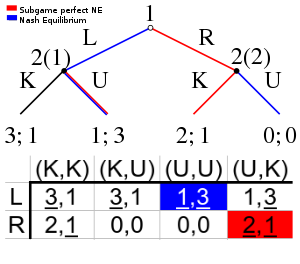
Non-credible threat
Encyclopedia

Game theory
Game theory is a mathematical method for analyzing calculated circumstances, such as in games, where a person’s success is based upon the choices of others...
and economics
Economics
Economics is the social science that analyzes the production, distribution, and consumption of goods and services. The term economics comes from the Ancient Greek from + , hence "rules of the house"...
to describe a threat in a sequential game
Sequential game
In game theory, a sequential game is a game where one player chooses his action before the others choose theirs. Importantly, the later players must have some information of the first's choice, otherwise the difference in time would have no strategic effect...
that a rational player would actually not carry out, because it would not be in his best interest to do so.
For a simple example, suppose person A walks up, carrying a bomb, to another person B. A tells B he will set off the bomb, killing them both, unless B gives him all his money. If A is rational and non-suicidal he stands nothing to gain from setting off the bomb, so his threat cannot be considered credible. On the other hand, a person in the situation of B might give A his money, fearing that A is not rational, or might even be suicidal.
A non-credible threat is made on the hope that it will be believed, and therefore the threatening undesirable action will not need to be carried out. For a threat to be credible within an equilibrium
Solution concept
In game theory, a solution concept is a formal rule for predicting how the game will be played. These predictions are called "solutions", and describe which strategies will be adopted by players, therefore predicting the result of the game...
, whenever a node is reached where a threat should be fulfilled, it will be fulfilled. Those Nash equilibria
Nash equilibrium
In game theory, Nash equilibrium is a solution concept of a game involving two or more players, in which each player is assumed to know the equilibrium strategies of the other players, and no player has anything to gain by changing only his own strategy unilaterally...
that rely on non-credible threats can be eliminated through backward induction
Backward induction
Backward induction is the process of reasoning backwards in time, from the end of a problem or situation, to determine a sequence of optimal actions. It proceeds by first considering the last time a decision might be made and choosing what to do in any situation at that time. Using this...
, the remaining equilibria are called Subgame perfect Nash equilibria.

